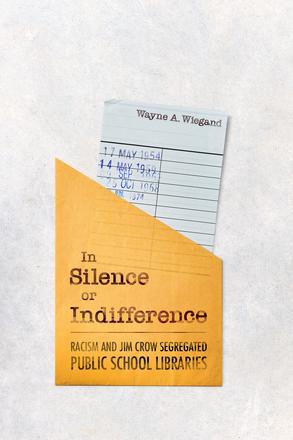
In Silence or Indifference
Racism and Jim Crow Segregated Public School Libraries
An unflinching history critiquing librarianship during the Jim Crow era
Description
Librarians around the country are currently on a battleground, defending their right to purchase and circulate books dealing with issues of race and systemic racism. Despite this work, the library community has often overlooked—even ignored—its own history of White supremacy and deliberate inaction on the part of White librarians and library leadership. Author Wayne A. Wiegand takes a crucial step to amend this historical record. In Silence or Indifference: Racism and Jim Crow Segregated Public School Libraries analyzes and critiques the world of professional librarianship between 1954 and 1974.
Wiegand begins by identifying racism in the practice and customs of public school libraries in the years leading up to the Brown v. Board of Education decision. This culture permeated the next two decades, as subsequent Supreme Court decisions led to feeble and mostly unsuccessful attempts to integrate Jim Crow public schools and their libraries. During this same period, the profession was honing its national image as a defender of intellectual freedom, a proponent of the freedom to read, and an opponent of censorship. Still, the community did not take any unified action to support Brown or to visibly oppose racial segregation. As Black school librarians and their Black patrons suffered through the humiliations and hostility of the Jim Crow educational establishment, the American library community remained largely ambivalent and silent.
The book brings to light a distressing history that continues to impact the library community, its students, and its patrons. Currently available school library literature skews the historical perspective that informs the present. In Silence or Indifference is the first attempt to establish historical accountability for the systemic racism contemporary school librarianship inherited in the twenty-first century.
Reviews
"An important and gravely thought-provoking look at when, where, and how the library profession failed a disenfranchised people."
- Candace Lewis, founding librarian, UCLA Rae Lee Siporin LGBTQ+ Library
"Wayne Wiegand has taken our blinders. Whether silent or indifferent, our professional association—and the library field at large—ignored the effects of segregation on school libraries and librarians. Many thanks to Dr. Wiegand for this important and revealing work."
- Patricia Glass Schuman, past president of the American Library Association
"Dr. Wiegand has done a masterful job documenting the racist practices found in public school libraries and perpetrated by White librarians on Black school children and Black school librarians in the Jim Crow South. It is very disturbing that the national professional library community provided little support for Black school librarians and students when, in 1954, Brown v. Board of Education found that separate education was not equal education. Although the implementation of the Elementary and Secondary Education Act in 1965 motivated some integration of public school libraries, the lack of significant progress demonstrated the profession’s resistance to this movement. It is important that the profession acknowledge this history and ensure that, in moving forward, we dedicate ourselves to providing collections and services that reflect the life experiences of Black students and all other students that we serve."
- Susan Hildreth, Institute of Museum and Library Services director, 2011–2015, and California state librarian, 2004–2009